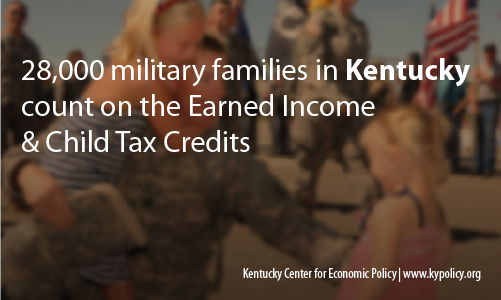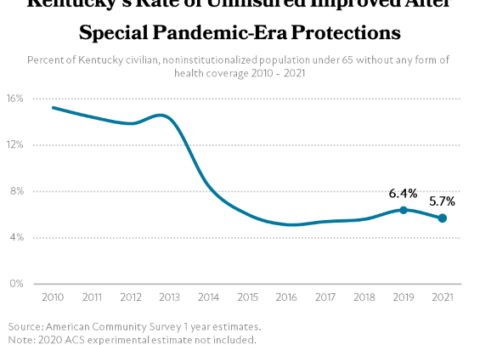New Report from the Center on Budget and Policy Priorities
Working Family Tax Credits Help Kentucky’s Military Families
About 28,000 veteran and active-duty military families in Kentucky receive the federal Earned Income Tax Credit (EITC) or the low-income component of the Child Tax Credit (CTC), according to a new report from the Washington, DC-based Center on Budget and Policy Priorities.
“Every year when we get our credits, we pay off our outstanding debt,” said Jessica Deis, a Kentucky mother of three whose husband, a veteran of the Marine Corps, works two jobs. “With the credits, I’m able to stay on top of our finances for at least six months.”
Nationally, roughly 1.5 million military families, which include about 3 million children under age 18, received one or both of the credits. The credits make a major difference to their economic security:
- The EITC and CTC together keep more than 140,000 military families — with nearly 300,000 children and 600,000 total family members — from falling below the poverty line, based on the federal government’s Supplemental Poverty Measure, which counts income from tax credits.
- These credits reduce the severity of poverty for about another 800,000 members of military families.
- The credits also help working families with incomes modestly above the poverty line who still struggle with basic expenses like housing, school clothes, car repairs, and groceries.
The tax credits can also increase opportunity for children in military families. Recent rigorous research demonstrates that EITC receipt is linked to improved performance (including better test scores) by children in school — and to increased employment and earnings when the children reach adulthood.
Jessica Dies’s family is more financially secure today than she was growing up with her aunt. “I remember what a relief it was for her to get the earned income credit at the beginning of the year. The lights wouldn’t be turned off and we could have a big dinner. It kept us from getting evicted.”
Only people who are working can claim the credits, which were modestly expanded in recent years to provide more help to more families. On average the credit amounts to $1,000 per household from the low-income portion of the Child Tax Credit in 2011 and $2,650 from the EITC.
“There’s a lot at stake for Kentucky’s military families when it comes to the Earned Income Tax Credit and Child Tax Credit,” said Anna Baumann, Research and Policy Associate at the Kentucky Center for Economic Policy (KCEP). “It is very important that Congress supports our military families by protecting these tax credits including the improvements made in recent years like the EITC expansion for families with three or more children.”
Kentucky could further support these families by enacting a state-level EITC, which about half of states already provide. The Governor’s 2012 Blue Ribbon Commission on Tax Reform included in its recommendations that Kentucky enact an EITC at 15 percent of the federal credit.
###
The Center on Budget and Policy Priorities’ full report, Working-Family Tax Credits Help Over One Million Military Families can be found at: http://www.cbpp.org/cms/index.cfm?fa=view&id=3986.
The Kentucky Center for Economic Policy is a non-profit, non-partisan initiative that conducts research, analysis and education on important policy issues facing the Commonwealth. Launched in 2011, the Center is a project of the Mountain Association for Community Economic Development (MACED).



